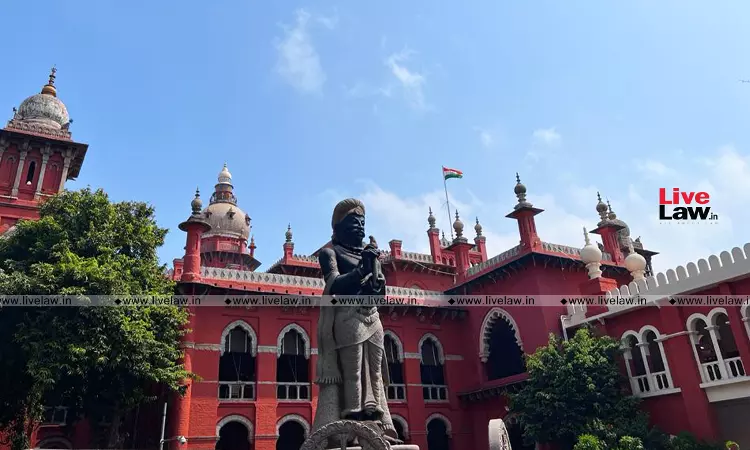- Home
- /
- High Courts
- /
- Madras High Court
- /
- When Grama Natham Land Is Occupied...
When Grama Natham Land Is Occupied And Such Occupation Is Accepted By State, It Becomes Private Property; Not Encroachment: Madras HC
Upasana Sajeev
2 April 2025 2:00 PM IST
The Madras High Court has recently clarified that when a grama natham land (village house site) is occupied by an individual and such occupation has been recognized by the State through successive transfers, it becomes the private property of the occupant and such lands cannot be regarded as government lands. “Where the grama natham land is occupied and such occupation has...
The Madras High Court has recently clarified that when a grama natham land (village house site) is occupied by an individual and such occupation has been recognized by the State through successive transfers, it becomes the private property of the occupant and such lands cannot be regarded as government lands.
“Where the grama natham land is occupied and such occupation has been recognized by the State by way of successive transfers etc., the land is the private property of the occupant. Such lands cannot be regarded as Government property nor can they be regarded as encroachments by virtue of the exception contained in Section 2 of the Act,” the court said.
While doing so, Justice Anand Venkatesh criticised an earlier order passed by the bench of Justice SM Subramaniam and Justice K Rajasekar for taking a different view. The single judge remarked that the division bench's direction was directly in conflict with the declared law and the court had virtually directed the State to issue a fresh circular on the lines of an earlier circular that had already been declared unconstitutional by various decisions.
“If the Division Benches of the High Court start giving contradictory directions and speak in different voices, the very edifice of the High Court, as an independent institution, will be put to peril. It is very unfortunate that the Division Bench, in the case of Anbananthan, has thrown all the norms of judicial propriety to the winds and has virtually directed the State to flout the orders of the earlier Division Bench in the case of Babu by issuing a fresh circular on the lines of an earlier circular, which had been declared unconstitutional. In the considered opinion of this Court, such a direction could not have been issued by a Coordinate Bench ignoring a declaration of law made by an earlier Division Bench,” the single judge said.
Though the single judge also pondered on the necessity of referring the matter to a larger bench, the judge further noted that since the division bench had failed to follow binding precedents, the decision itself was per incuriam.
The court was dealing with petitions seeking a grant of patta for grama natham lands. The petitioners submitted that as per the earlier judgments of the court, patta could be issued for occupied grama natham lands. The respondents, on the other hand, relied on the division bench's order that had held that patta could not be granted for grama natham lands.
The Special Government Advocate argued that all lands including the grama natham lands were properties of the Government after the commencement of the Land Encroachment Act, 1905. He thus pointed out that one could not occupy a grama natham land and declare himself to be the owner of the land. It was submitted that the right claimed by the individual through occupation would serve the rights of all the other citizens in rem. Thus, it was argued that such ownership could be conferred only by the sovereign power under law.
The court however discussed the earlier orders passed by the court discussing the issue and held that where persons had occupied grama natham lands and put up houses and such occupation was recognised by the State, the portions could never be regarded as vesting with the State. The court also noted that through judicial precedents, the courts had also brought in a distinction between occupied and unoccupied grama natham land and clarified that unoccupied grama natham land vests with the State.
“Where the land is unoccupied, the paramount title to these lands would vest in the State to be dealt with according to the Revenue Standing Orders. Unauthorized occupation in these lands can be dealt with under the provisions of the Act. In cases where unoccupied grama natham is temporarily or recently occupied and there is no evidence of any recognition of such occupation by the State, here too the position is akin to what is set out in paragraph (b) supra. The position would also be the same in respect of an occupant of grama natham lands, against whom, the State has levied prohibitory assessment under the Act by issuing B Memos,” the court said.
Thus, noting that the issue had been settled, the court directed the Commissioner for Land Administration to issue a circular in line with the conclusions and directing the Revenue Authorities to examine applications for patta by applying the guidelines.
Counsel for Petitioner: Mr. N. Manokaran, Mr. A. Parthasarathy, Mr. R. Sathishkumar, Mr. Vijayakumari Natarajan
Counsel for Respondents: Mr. Edwin Prabhakar, State GP assisted by Mr. A. Selvendran, SGP
Case Title: NS Krishnamoorthi and Others v. The District Collector and Others
Citation: 2025 LiveLaw (Mad) 124
Case No: W.P.Nos.4936, 6015, 6514 & 6795 of 2025



